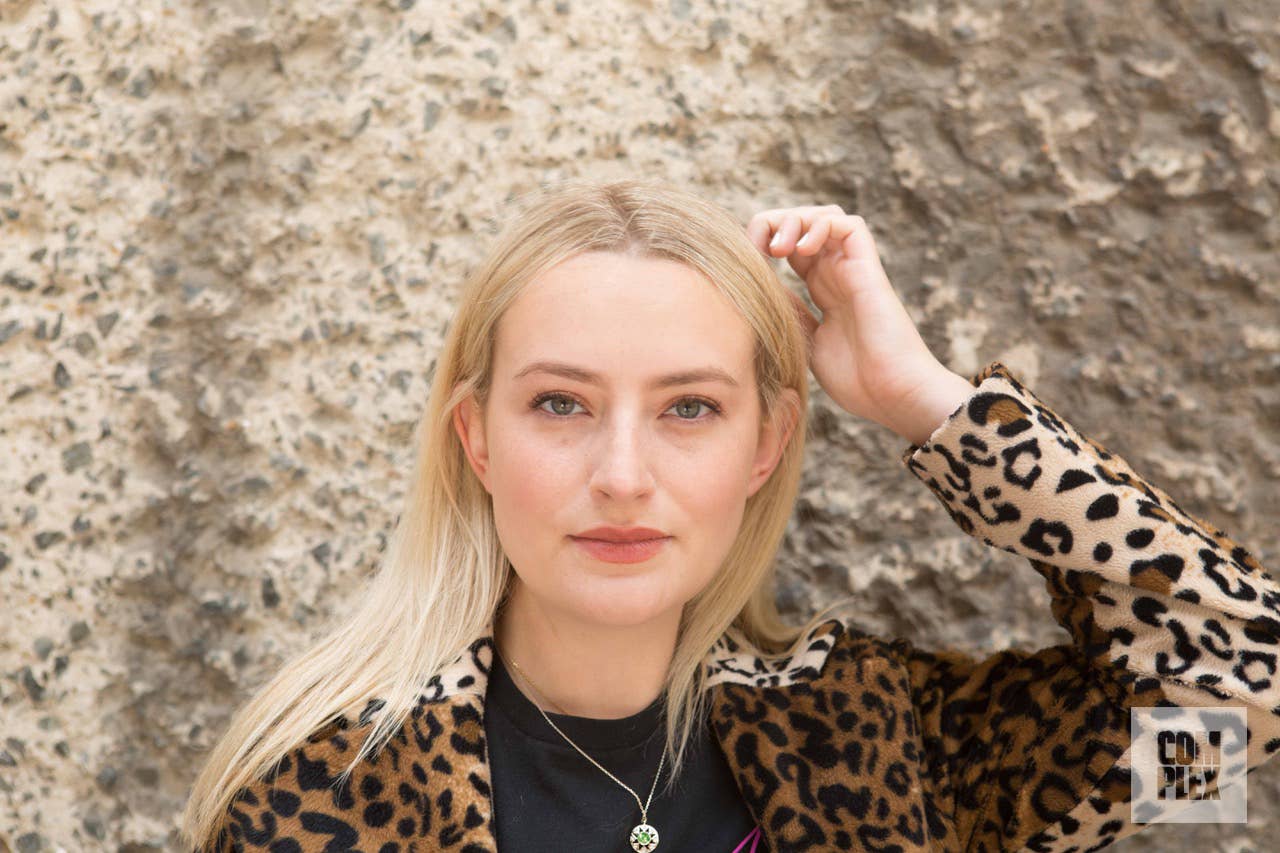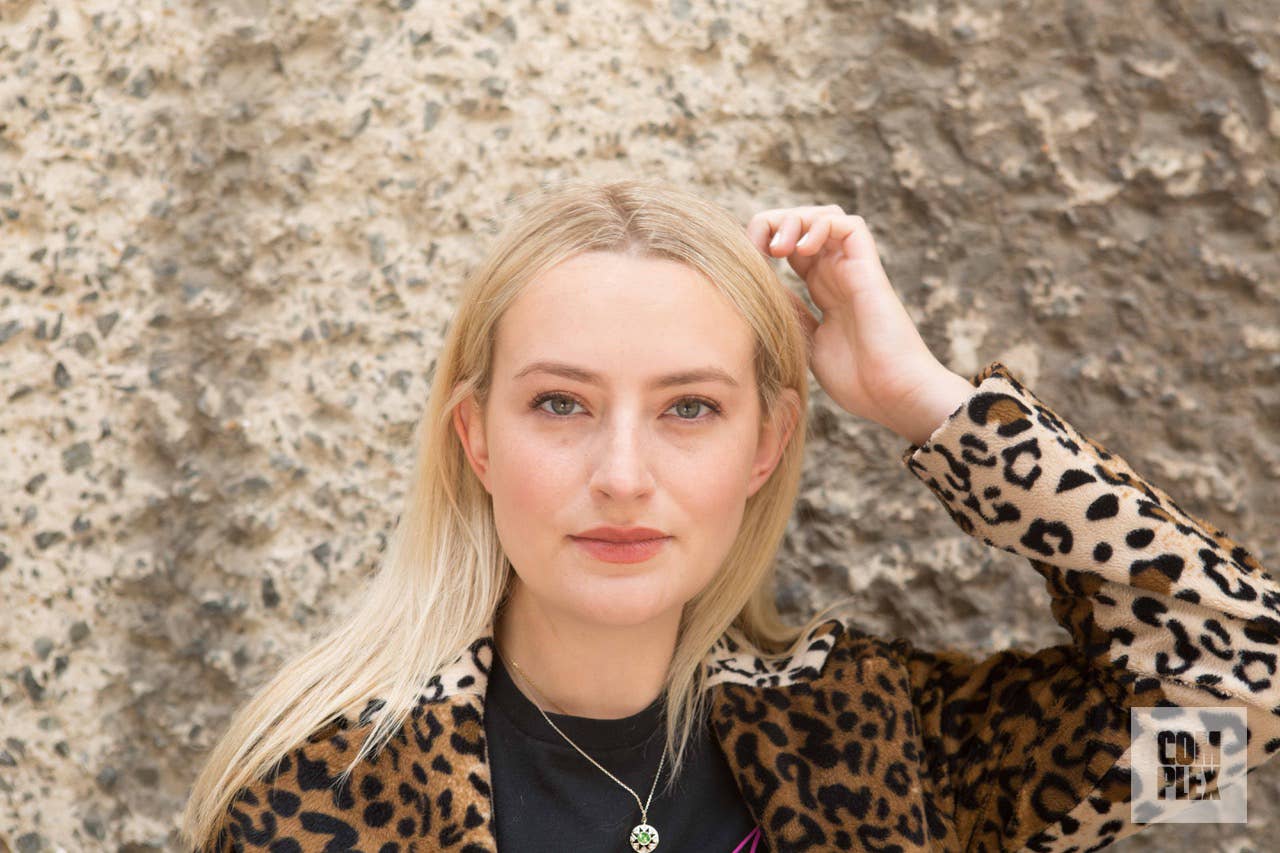
A poker-faced journalist, privileged with the access-all-areas to grime and UK rap’s most influential players, Amelia Dimoldenberg is currently sitting on 11 million views on YouTube. Launching her hilariously awkward Chicken Shop Date series in 2014, with grime superstar Ghetts in the hotseat at a Chicken Cottage in London, Amelia has now flirted her way through 25 guests on the show. From Big Narstie and Dave to Rae Sremmurd and Sean Paul, they’ve all been on the receiving end of the 23-year-old’s most cringe-worthy moments.
Placing herself candidly in the headlights of the industry’s most savage wordsmiths, posing the leading questions no person would ever want to ask, Amelia uses her subversive comedy to catch her poised subjects off-guard, revealing a less composed side to these well-known personalities. Fighting off the overwhelming urge to bond and befriend these epically cool artists and instead forcing the situation to become silent and uncomfortable, she is a unique influence in the world of music journalism. Regularly confronted with comments questioning her looks and ability in sexist and demeaning opinion boxes, Amelia’s conviction in her work is admirable and quite progressive.
Brands are now falling over themselves to work with Amelia, such is the power of her influence. With her own brand of mockumentaries in the works for the likes of VICE and Channel 4, her passion for exploring culture trends and then challenging stereotypes is intelligent and highly informative. Check her IG, and sure there’s another selfie of a non-smiley girl, but read the caption, shift your focus and look for the very British humour in it.
We caught up with Amelia to discuss how she’s juggling her increasingly busy schedule.
“I wanted to be the antithesis of a bubbly presenter because I was bored of seeing that. The average TV presenter was good at being non-stop chatty and bubbly; I wanted to be the opposite.”
[After I greet her on the phone, Amelia tells me: “I’m actually in a conference room right now. I feel like I am constantly in meeting rooms, discussing work. It’s been very busy which is amazing—I love being this busy! Last year, when I wasn’t so busy, I could fall into the trap of questioning my exoteric existence when I didn’t have a job on. So I am happy to be this busy.”]
COMPLEX: I can instantly tell from chatting now that you’re forthcoming, very open, and easy to click with. How hard is it to maintain that deadpan persona on camera?
Amelia Dimoldenberg: When I meet people on the street or in real life, they always say they’re so intrigued to know if I’m the same person on Chicken Shop Date as I am in real life. And of course not, no—I would have no friends! I am not deadpan all the time, but that is a part of my personality. I was always the sarcastic one at school and it got me in a lot of trouble, both with teachers and with boys. I do think when people meet me, they expect me to come across as ‘the character’ and not the real me. I am not that person but it isn’t far removed.
From what point did this personality first manifest?
I started Chicken Shop Date as a column in a magazine called Cut, which was made by a 21-year-old at a youth club in Royal Oak. When I first started writing what I thought was ‘funny’, it came in the form of Facebook statuses. From that time when a Facebook status was your diary, I would write in deadpan statuses which used to get 10 likes and I would think, ‘This is fantastic! People love me!’ That’s how I began to start developing my tone and that witty way of writing. I used Twitter as well. I knew when I started writing Chicken Shop Date, I wanted it to feel funny in a natural way so that I would be writing from a sarcastic place. Then when I began to start filming the first episode, I spoke the way I wrote. I think that my tone in it makes for more awkward and funnier interaction; I know that if I don’t reply to something or say ‘wow’ with no expression, it will make a more interesting interaction.
I wanted to be the antithesis of a bubbly presenter because I was bored of seeing that. The average TV presenter was very good at being non-stop chatty and bubbly; I wanted to be the opposite of that, and make that my thing. I’ve always been so obsessed with being original and that’s what I try and do with Chicken Shop Date. When I watch interviews with musicians, people are always asking about the musical influences and that just doesn’t make anything stand out, that same line of questioning. So I needed my personality to stand out, and I do that by taking it and acting it slightly.
Everything you do is simultaneously so off-centre, but so on point. Did you ever worry people wouldn’t get it?
I guess, at the beginning, I felt really confident that through my sense of humour, what I was trying to put across with my IG and YouTube channel, was fun. The British sense of humour is sarcastic and deadpan… I’m still hoping that suddenly comes around to the fact that I am hilarious! When I first started putting up videos, the comments would read: “What the fuck is this?” There were so many comments on my appearance. People are used to seeing a really dolled-up, good-looking presenter and there’s a real problem with female presenters being expected to look a certain way. It is not the case with male presenters—they can dress however they want, look however they want.
How did you deal with that?
It’s frustrating because it doesn’t happen to male comics. It’s the internet; it’s toxic and it’s not a nice place for women a lot of the time. But I am confident in myself. I know I am attractive so I won’t listen to those comments. I won’t let that dynamic get to me because it’s a byproduct of the internet.
“I was 19 when I started making the series and, as a young woman, I’m becoming more confident in myself and the show.”

I’ve interviewed artists before and there is always that underlying desire to want your subject to like you, to click with you and get validation from someone that so many people love. Do you ever suffer from a desire to go against your character and fangirl all over the person you’re interviewing?
I was speaking with [the comedian] Sara Pascoe recently and we were talking about that same thing: the knowing that you’re going to need to click into a character and be abrasive but, at the same time, you want this person to like you. I just tell myself I have to go with the character. When you study as a journalist at university, it is impressed upon you that you are not the interviewee’s friend—you are there to interview the person objectively. Sometimes I think after shooting an episode that it could have been more awkward and my wanting them to like me got the better of me; that’s something I’m still working on. I’m still developing my character.
I just got a great comment on a new video discussing the progression of my character, actually. If you watch my Ghetts episode, you can see how different things are now. I think I’m a lot more vocal now. A lot of people don’t know about Chicken Shop Date and are only just finding out about it. I get messages from people saying they just binge-watched the whole series. I’ve been doing this for nearly five years now, so it’s interesting to see the progression of me. I was 19 when I started making the series and, as a young woman, I’m becoming more confident in myself and the show.
Have you had a genuine crush on any of your dates?
No comment! It’s so awkward. We have so many people watching. I admire every guest I have on; their talent, their hard work. What’s going on in British music is so exciting and to be part of that and from London, where so much is happening, I am a bit in love with them—for that reason.
Are any of the videos too awkward to watch back?
I find it really awkward to watch the rushes back. You do one take, so it’s just 45 minutes of footage and it takes me a day to see it. I should watch it immediately because time is money, but literally, I can’t because I find it so awkward. After the first view, it’s fine. My mum watches them. She’s on the iPad, constantly going through the back catalogue of Chicken Shop Date. She loves it.
How do you find it being backstage at events like Wireless amongst all the hype and hedonism?
I find it easier to work in those situations because it gives me purpose. It would be my absolute nightmare to be stuck backstage where no one knows who I am, and I’m just hanging around. I prefer to have a reason to be present. Obviously, my vibe is awkward and people expect me to be awkward, so it’s just an awkward experience. I’m not friends with many musicians, but I am starting to be a bit more now. I saw Dave backstage once and I said “hey” and he said “hey” back, then he walked away. I also think I shouldn’t be friends with them because if I was, it wouldn’t work. With the show becoming more popular, I’m invited to a lot more events. I was recently hanging out with AJ Tracey at an event. He’s really nice, but still, it was very awkward. I said, “Do you mind that I tweet about you all the time?” He said, “No! It’s hilarious.” I replied: “Thank god, because I have something ready to go in my drafts right now.” It’s funny!
“I feel a lot of responsibility to make sure what I’m doing is authentic and respectful.”
The topic of you being a white woman in a black space has come up online recently, which even saw Giggs come out and say his piece. But how would you respond to this?
I think it’s important to talk about these things. I feel a lot of responsibility to make sure what I’m doing is authentic and respectful. I’m also aware, part of the reason people like watching my videos is because they play off the humour that naturally occurs when two different cultures collide. I take my job in the scene that I’m working in very seriously. As I’ve said before, I’m very aware of my privileged position as a white woman, however I hope I’m using it to fully support UK artists. Chicken Shop Date has always been a grassroots project that I’ve self-funded and produced myself. I started interviewing UK rappers and musicians when I was 17 for an under-21’s magazine that was run out of a youth club in North West London.
It’s critical to me that the tone of everything I do is correct, so I listen to others and turn down jobs if I’m not the right fit. I think that’s so important. Black British broadcasters are definitely underrepresented in UK media, and that needs to change. We must have more black voices telling their own stories if we want the narrative to evolve. There are, of course, many talented black females presenting, writing and broadcasting at the moment; people like Chidera Eggerue, Clara Amfo, Maya Jama, as well as monumental books such as Slay In Your Lane, are really leading the charge and I will continue to support.



